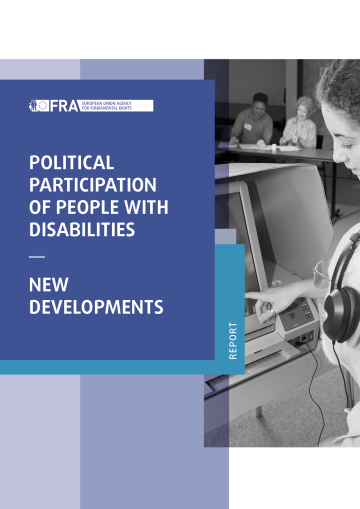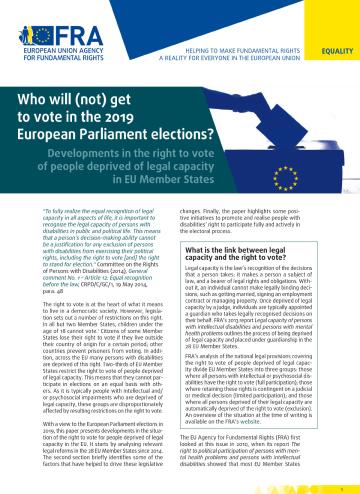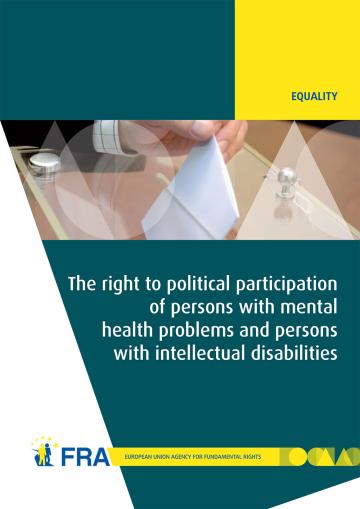The European Union (EU) and its functioning are founded on representative democracy. Every Union citizen has the right to participate in the democratic life of the Union (Article 10(3) of the Treaty on European Union (TEU)). This right includes the right to vote and to stand as candidates in elections to the European Parliament and in municipal elections (Article 20(1)(b) of the Treaty on the Functioning of the European Union (TFEU)). This is also laid down as a fundamental right in Articles 39 (right to vote and to stand as a candidate at elections to the European Parliament) and 40 (right to vote and to stand as a candidate at municipal elections) of the Charter of Fundamental Rights of the European Union (Charter).
European and local elections represent key moments for EU citizens to choose their political representatives, stand for election and express their opinions on decisions at the EU and local levels that affect us all. And yet the strategy for the rights of persons with disabilities 2021–2030 notes that persons with disabilities still face considerable barriers to participation in political life. It also notes that 800 000 EU citizens were deprived of the right to participate in the 2019 elections to the European Parliament because of their disabilities.
Accessibility barriers in the Member States affect millions of people in the EU. In 2022, 27 % of the EU’s population aged 16 years and over reported some or severe long-standing limitations on their usual activities due to health problems. 19.8 % reported some limitation and 7.2 % reported a severe limitation, according to Eurostat. 39.6 % of the EU population experience physical or sensory limitations, the European Health Interview Survey indicates. The accessibility of the electoral process is therefore key to ensuring that people with disabilities can exercise the right to vote and the right to stand for the European and local elections on an equal basis with others.
Persons with disabilities must be guaranteed political rights and the opportunity to enjoy them on an equal basis with others, under Article 29 of the United Nations Convention on the Rights of Persons with Disabilities (CRPD). The EU and its Member States are parties to this convention, and the European Union Agency for Fundamental Rights (FRA) is a member of the EU framework to promote, protect and monitor its implementation by the Union. The CRPD aims to promote, protect and ensure the full and equal enjoyment of all human rights and fundamental freedoms by all persons with disabilities, and to promote respect for their inherent dignity. The CRPD represents a revolutionary shift from the charity and medical model of disability to the human rights model of disability (Legal corner 1).
The CRPD recognises in its preamble that ‘disability is an evolving concept’ and ‘results from the interaction between persons with impairments and attitudinal and environmental barriers that hinders their full and effective participation in society on an equal basis with others’. It requires States Parties to ‘combat stereotypes, prejudices and harmful practices relating to persons with disabilities’ (Article 8).
Over the years, ahead of elections to the European Parliament, FRA has consistently provided up-to-date information about the rights of persons with disabilities to vote and to stand for election. In 2010, the FRA report The right to political participation of persons with mental health problems and persons with intellectual disabilities recalled the international and European standards favouring the full participation of persons with intellectual disabilities and persons with mental health problems in the electoral process. The comparative law analysis highlighted the diverse approaches that the EU Member States adopted. In most, people who had lost their legal capacity were automatically deprived of their right to political participation.
In 2014, the FRA report The right to political participation for persons with disabilities: Human rights indicators showed that legal and administrative barriers, inaccessible processes and information, and a lack of awareness of political rights could deny persons with disabilities the opportunity to participate in the political lives of their communities. The research also revealed the absence of reliable and comparable data about the experiences of persons with disabilities when taking part in elections in the EU.
In 2019, the FRA paper ‘Who will (not) get to vote in the 2019 European Parliament elections?’ focused on developments in the situation of the right to vote for people deprived of legal capacity in the EU. Whereas two thirds of EU Member States restricted in some ways the right to vote of people deprived of their legal capacity, the paper also found slow but steady progress in realising the right to vote for all.
The present report presents developments in the EU Member States and at the EU level on political participation of people with disabilities in European and municipal elections. It is structured around four main themes that the research highlights: legal capacity, accessibility, rights awareness and opportunities for people with disabilities to participate politically. Legal capacity is in the first chapter, given its supreme importance for exercising the right to vote and the right to stand for elections. Without legal capacity, people cannot exercise the right to political participation.
This report uses new data from the human rights indicators on political participation of persons with disabilities, which FRA, the European Commission and the Academic Network of European Disability Experts developed in 2014. These indicators are central to measuring the Member States’ commitments to making full participation of people with disabilities in the European and local elections a reality, their efforts to do so and the results. The data collected based on these indicators formed the basis for FRA’s 2014 report The right to political participation for persons with disabilities: Human rights indicators and the 2019 paper ‘Who will (not) get to vote in the 2019 European Parliament elections?’
The present analysis draws from the updated data on selected human rights indicators collected by FRA’s research network, Franet. The report covers 2014–2024, focusing on the developments in the EU Member States up to February 2024.
In addition, FRA sent questionnaires to the national human rights institutions, ombuds institutions and equality bodies working on disability issues. It also consulted civil society through the Fundamental Rights Platform. The European Commission and the FRA national liaison officers were consulted during the drafting of this report. So were political parties participating in the 2024 European elections.
The report contains promising practices and puts forward recommendations for changes to make at the national and EU levels to secure people with disabilities the right to vote and the right to stand for election.
The report addresses its findings to policymakers at the national and EU levels, Member States’ election authorities and staff, and Member States’ bodies overseeing the legality and integrity of electoral processes. National human rights institutions, equality bodies, ombudspersons and organisations of people with disabilities working in the field can also use the report.
The report is accompanied by separate country overviews, which were used to update the human rights indicators. Both the country reports and the human rights indicators are available on the Data Explorer.
Alongside core international human rights treaties, the CRPD is a specific human rights instrument aimed at promoting, protecting and ensuring the full and equal enjoyment of all human rights by all persons with disabilities. The CRPD is the first UN human rights treaty to which the EU has itself acceded (Council Decision 2010/48/EC concerning the conclusion, by the European Community, of the United Nations Convention on the Rights of Persons with Disabilities, OJ L 23/35).
FRA is a member of the EU framework set up to promote, protect and monitor the Union’s implementation of the Convention. The framework comprises FRA, the European Ombudsman, the European Parliament and the European Disability Forum (EDF). The Committee on the Rights of Persons with Disabilities (CRPD Committee) reviews the EU’s implementation of the CRPD. The EU framework also contributes to that review.
All 27 EU Member States have signed and ratified the CRPD. Both the EU and the Member States are under an obligation to bring their legislation and practice in line with the Convention.
The CRPD includes a broad conceptualisation of disability as deriving from the interaction between the individual’s impairments and external barriers. The general principles underpinning the Convention include respect for inherent dignity, individual autonomy, including the freedom to make one’s own choices, and independence of persons; non-discrimination; full and effective participation and inclusion in society; equality of opportunity; accessibility; and equality between men and women (Article 3 CRPD). Persons with disabilities have the right to equal recognition before the law under Article 12 of the CRPD.
The CRPD Committee, a body established to supervise the application of the Convention, considers that no derogation can be applied to Article 12. People may never be deprived of their legal capacity based on their ‘disability or the existence of an impairment (including a physical or sensory impairment)’ (General comment No 1 – Article 12: Equal recognition before the law (2014), paragraphs 3–9, quoting paragraph 9).
However, the European Court of Human Rights (ECtHR) in its case-law has maintained an approach that allows restrictions on the right of persons under guardianship to vote under Article 3 of Protocol No 1 to the European Convention on Human Rights and Fundamental Freedoms (ECHR). The restriction must be based on an individual court decision (ECtHR, Strøbye and Rosenlind v Denmark, Nos 25802/18 and 27338/18, 2 February 2021; Caamaño Valle v Spain, No 43564/17, 11 May 2021; Anatoliy Marinov v Bulgaria, No 26081/17, 15 February 2022).
Article 29 of the CRPD explicitly requires States Parties to ‘ensure that persons with disabilities can effectively and fully participate in political and public life on an equal basis with others, directly or through freely chosen representatives, including the right and opportunity … to be elected’ and sets out several measures to enable this. The CRPD Committee noted that no limitation should be put on this right based on legal capacity considerations (General comment No 1 – Article 12: Equal recognition before the law (2014), paragraph 48; Zsolt Bujdosó and five others v Hungary, Communication No 4/2011, 16 October 2013).
The Member States are divided between two conflicting interpretations of international human rights instruments in the field. The CRPD Committee’s interpretation of the CRPD promotes the full participation of persons with disabilities without legal capacity limitations. Conversely, as noted, the ECtHR’s interpretation of the ECHR still allows restrictions on the voting rights of persons under guardianship.
To ensure the effective exercise of the right to vote, voting procedures, facilities and materials, including those of political meetings and political parties or individual candidates, must be accessible (General comment No 2 – Article 9: Accessibility (2014), paragraph 43). Denial of access in the context of an election might constitute discrimination prohibited under the CRPD, especially Articles 5 (equality and non-discrimination), 9 (accessibility) and 29 (participation in political and public life). All forms of disability-based discrimination should be recognised in national law and addressed by effective mechanisms of legal redress and reparation under the CRPD.
At the EU level, Article 20 of the TFEU lays down the right to vote and to stand as candidates in elections to the European Parliament and in municipal elections in the Member State of residence. The EU Charter of Fundamental Rights, which is binding upon the EU institutions, and on the EU Member States when they are implementing EU law (Article 51 of the Charter), prohibits discrimination based on disability (Article 21 of the Charter) and promotes the integration of persons with disabilities (Article 26 of the Charter). The Charter protects the right to vote and stand as candidates in elections to the European Parliament (Article 39 of the Charter) and municipal elections (Article 40 of the Charter). It also guarantees the right to good administration (Article 41 of the Charter) and the right to an effective remedy and to a fair trial (Article 47 of the Charter).
The EU showed commitment to ensuring the equal participation of people with disabilities in the European and local elections, but also noted several barriers to participation. The European Commission assessed the 2019 European Parliament elections in a report on the 2019 elections to the European Parliament. In that report, it concluded that there was still progress to be made on the democratic participation of citizens with disabilities and announced that for the 2024 elections it would put a specific focus on that issue (pp. 29 and 10, respectively).
The European Economic and Social Committee noted in the report ‘The real right of persons with disabilities to vote in European Parliament elections’ (2019) that laws and organisational arrangements (technical barriers) in each Member State excluded some voters with disabilities from participating in the European Parliament elections. It noted restrictions at polling stations, no possibility of voting independently for blind voters, lack of accessible information, obstacles to mobility and cumbersome administrative proceedings.
In the strategy for the rights of persons with disabilities 2021–2030 (European disability strategy), the European Commission envisages several actions to guarantee the political rights of persons with disabilities on an equal basis with others.
In November 2023, 22 Member States, the EDF and the EU Economic and Social Committee endorsed the ‘Declaration of the Spanish Presidency of the European Council on expanding voting rights of persons with disabilities’. The declaration aims to ensure that people with disabilities can enjoy the right to vote and access to political participation. Its signatories undertook, among other things, to increase support to disabled people’s organisations (DPOs) to enable meaningful participation and greater influence on decision-making. They will also encourage the removal of barriers, particularly to digital services, by promoting and adopting common accessibility requirements that favour the effective participation of persons with disabilities in political and public life. They also commit to ensure, through reasonable accommodation, the accessibility of the whole electoral process, to facilitate the possibility of voting independently and in secret.





